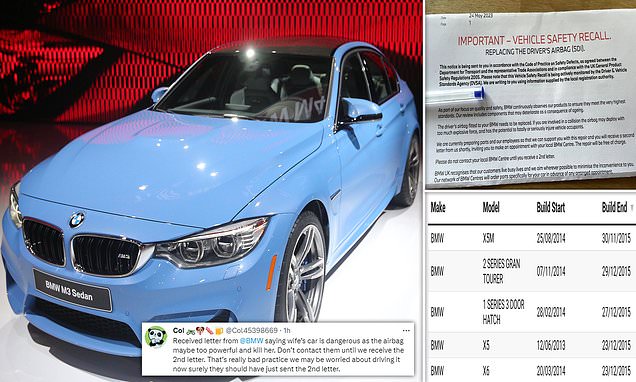
- Affected cars fitted with an airbag inflator made by Japanese firm Takata
- Takata used ammonia nitrate to power the airbag which deteriorates over time
BMW is recalling almost 100,000 cars on British roads after issuing a warning about a potentially fatal fault which causes ‘over-aggressive combustion’ in the affected cars’ airbags.
It is feared the ‘over-aggressive combustion’ could rip apart the airbag’s housing and shower the driver with shrapnel.
The company is offering to replace defective airbags on any of the affected cars which were built between 2012 and 2015 – including some of the marque’s most high-powered motors.
The Driving Vehicle Standards Agency was alerted by the company about the defect.
BMW has assured owners that this ‘safety critical’ repair will take place as soon as possible at their local BMW service centre.
The affected cars are all fitted with an airbag which uses a detonator made by Takata, which contains ammonium nitrate.
It is feared the chemicals can deteriorate over time and making them more unstable, with reports of deaths in cars using the devices in the United States.
According to the DVSA database of vehicle recalls, some 98,774 cars may need inspection and repair.
They cite the reason as: ‘A possible degradation of the propellant tablets could lead to an over-aggressive combustion in the event the airbag is activated which may cause the inflator body to rupture.’
The DVSA said the defective airbags must be replaced.
A BMW spokesperson said: ‘Since the recall was first announced, BMW has continuously engaged in a wide variety of customer outreach campaigns to encourage owners of affected vehicles to have this safety-critical airbag repair completed at no charge as soon as possible.
‘We encourage customers who have received this letter to have their vehicle checked and airbag replaced as soon as possible by contacting their local BMW Service centre.
‘Any BMW customer can also check the recall status of their vehicle at https://www.bmw.co.uk/recall.
The Takata airbag inflators were first identified as problematic in 2001. The company used ammonium nitrate to detonate the airbag, however the chemicals inside can deteriorate over time, especially if exposed to high heat and humidity.
It is feared that 32 people have been killed by the defective airbags across the globe.
More than 100 million cars with the Japanese-made inflators have been recalled.
Victims of the airbags have had large pieces of metal embedded into their face, with some injuries initially considered gunshot or stab wounds by first responders at the scene.
Some links in this article may be affiliate links. If you click on them we may earn a small commission. That helps us fund This Is Money, and keep it free to use. We do not write articles to promote products. We do not allow any commercial relationship to affect our editorial independence.






